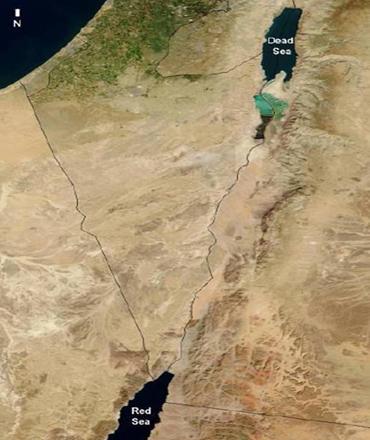You are here
Donors pledge around $400 million for Red-Dead project
By Hana Namrouqa - Dec 03,2016 - Last updated at Dec 03,2016
AMMAN — The government has raised approximately $400 million from donor countries and agencies to finance the first phase of the Red Sea-Dead Sea Water Conveyance Project (Red-Dead), a government official said on Saturday.
The funds were contributed during a high-profile conference, which was held on Thursday at the shores of the Dead Sea, in the form of grants, very easy loans and in-kind assistance, the official at the Ministry of Water and Irrigation said.
"In addition to the already raised funds, several other donor countries and international agencies and institutions showed interest in this mega water project and revealed that they are studying the possibility and the mechanism of financing it," the official told The Jordan Times over the phone.
The US embassy announced on Friday in a statement to the press that the US intends to contribute $100 million to the Red-Dead project.
US Ambassador to Jordan Alice G. Wells said in a statement e-mailed to The Jordan Times on Friday that the Red-Dead project will not only bring new water supplies, but it is also a novel approach to halting the decline of the Dead Sea, adding that it is an extraordinary cultural heritage site that attracts millions annually and is also an important resource for industry.
“Our support for Red-Dead reflects the recognition that while it is essential for Jordan, the United States, and other partners to focus on water management, we must simultaneously pursue technologies that help us increase water supply,” Wells said in the statement.
Meanwhile, a statement issued by the Water Ministry indicated on Saturday that in addition to the $100 million contributed by the US, the EU has pledged a grant worth 40 million euros and a very easy loan of 120 million euros through the European Investment Bank and the French Development Agency.
Also during the donor conference, Japan has announced that it will provide the project with pumps and equipment worth $20 million, while Italy announced that it will extend a grant worth 2 million euros and a very easy loan worth 50 million euros and Spain will support the project with an easy loan worth 50 million euros, according to the ministry’s statement.
In the statement, the ministry indicated that construction on the project’s first phase, which costs $1.1 billion, is slated for early 2018 and is scheduled to end in 2020.
Authorities have already shortlisted five consortiums out of 17 that have shown interest in implementing the first stage on a build, operate and transfer basis.
Under the first phase, a total of 300 million cubic metres (mcm) of water will be pumped each year. Eventually, up to 2 billion cubic metres of seawater will be transferred from the Red Sea to the Dead Sea annually under the Red-Dead project, according to the ministry.
A total of 85-100mcm of water will be desalinated every year, while the seawater will be pumped out from an intake located in the north of the Gulf of Aqaba.
In addition, a conveyor will be extended to transfer desalinated water as well as a pipeline to dump the brine into the Dead Sea to stop its constant decline, estimated at one metre every year.
The Kingdom will receive an additional 50mcm of water from the Lake Tiberias Reservoir annually to be added to its share from the desalination station to provide Aqaba with water, according to the ministry.
The Red-Dead project’s main components are a seawater intake structure; an intake pump station; a seawater pipeline; a desalination plant with a capacity of 65-85mcm per year; a desalination brine conveyance pipeline; two lifting pump stations; hydropower plants; and discharge facilities at the Dead Sea.
Jordan signed a memorandum of understanding (MoU) with Israel and Palestine in December 2013 to implement the first phase of the Red-Dead project.
Palestine will receive 30mcm of freshwater to cover its water deficit, according to the MoU, while Israel will buy its share of 50mcm of desalinated water from the project at cost value and sell Jordan the same amount of water in the northern Jordan Valley at a cost of JD0.27 per cubic metre.
Related Articles
AMMAN — The Red Sea-Dead Sea Water Conveyance Project is still on the agenda, despite Israeli procrastination, Prime Minister Omar Razzaz sa
AMMAN — The Water Ministry on Sunday signed the engineering services agreement for the first phase of the Red Sea-Dead Sea Water Conveyance
AMMAN — The Ministry of Water and Irrigation has modified the final submission date of the prequalification proposals for the first phase of

















